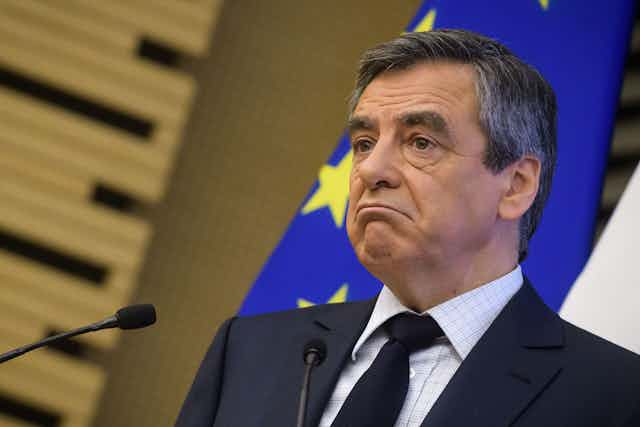To paraphrase Gérard Courtois, editorial writer for Le Monde, if the French weren’t just a few weeks away from a presidential election that will decide the future of one of the world’s largest economic powers, this Punch and Judy show might be amusing. But they are and it isn’t.
By what outwardly looks like a small miracle, François Fillon is still the Republicans’ candidate for the French presidency. He continues to insist that allegations that he employed members of his family in fake jobs are not an obstacle to his candidacy. Indeed, when he revealed that he was to be formally questioned about the matter, he went on the counterattack, accusing the government of manipulating the judiciary to carry out a “political assassination”.
Attacking the left might be just politics but accusing the judiciary of bias is populism. Fillon’s statement therefore didn’t go down well with his more moderate supporters.
A steady stream of defections from his camp – including his official spokesman and his campaign organiser – became a flood. Calls for him to stand down in favour of Alain Juppé appeared almost irresistible. An opinion poll even had Juppé winning the first round of the election, ahead of Emmanuel Macron – thereby eliminating Marine Le Pen.
It looked as if Fillon’s goose, if not cooked, had at least contracted avian flu. But he still held an important card in his hand: the unwavering support of the conservative, Catholic right. This group has no love for the more liberal, moderate Juppé. Just as he announced his intention to fight on, Fillon also announced a rally at the Place du Trocadéro – a square in the 16th arrondissement of Paris.
It later emerged that the mobilisation would be organised in collaboration with Sens Commun (meaning Common Sense, but also Shared Direction) – the political wing of the Manif pour Tous movement that emerged in opposition to the Hollande government’s legalisation of same-sex marriage.
Rallying to their man
Paris has a very clear political topography. The west belongs to the right, the east to the left, with the Louvre acting as a sort of dividing line. Thus, the Place de la Bastille is where the left celebrates its victories. And in the middle, the Place des Pyramides, with its golden statue of Joan of Arc, has been appropriated by the Front National.
The Place du Trocadéro, which offers the Eiffel Tower as a fine backdrop, was where Nicolas Sarkozy staged his last meeting before the second round of the 2012 election. It is also a square that can be divided in two so as to make the crowd there look much bigger than it really is. Fillon and what remained of his team asked supporters not to bring placards. Instead, they would supply tricolours. A tricolour waved in a Delacroix style fills much more space than a daubed piece of cardboard.

A large crowd did indeed turn out for the rally. Bruno Retailleau, the leader of the Republican group in the Senate, claimed they were 200,000 people there. That’s two-and-a-half times the capacity of the Stade de France. A more realistic estimate would be 40-50,000, but because of the way the crowd was shot (by Fillon’s team) it looked big enough. Critics might also say that if a right-wing candidate cannot organise a decent turn-out in the 16th, then they should probably give up.
In the end, the rally proved to be a tipping point. Fillon appeared on television later that evening to reiterate that he was staying in the race. Juppé’s moment had passed. The following morning, Juppé delivered a short but powerful speech to confirm that he would not seek to replace Fillon. He did, though, have stern words for his rival:
What a waste. In the wake of our primary, François Fillon, to whom I immediately and loyally gave my support, had an open path to the Elysée. But his system of defending himself [against the allegations] has led him down a blind alley.
Slowly but surely, in the days since, Fillon has put together a new team, in particular promoting Sarkozy supporters to important positions. There has also been talk of a “ticket” whereby Fillon would formally adopt François Baroin as his future prime minister, if he is elected. Many of those who had called for him to stand down have returned to the fold. Even the centre-right Union of Democrats and Independents, which had suspended its support for Fillon, has rallied overwhelmingly to him once more.
Fillon’s victory comes at a price. He has played the Republicans’ right against its left and the electorate against the party notables. The party, so carefully welded together by Jacques Chirac, Jean-Pierre Raffarin and Juppé in 2002, is on the brink of imploding. Only victory on May 7 can save it.
Somewhere beneath the crushing weight of the Fillon Affair is an election campaign struggling to escape and a country trying to understand who is proposing what for the next five years. Meanwhile, various left-wing heavyweights have begun to rally to Macron. And in its March 8 edition, Le Monde announced that one third of the French population agrees with the views of the far-right, although paradoxically, fewer voters find Marine Le Pen or her party appealing than in previous surveys. Nevertheless, a third of the votes will not win her the election.

